Trifluoroacetic Anhydride (TFAA) Market Insights 2025, Analysis and Forecast to 2030, by Manufacturers, Regions, Technology, Application
- Single User License (1 Users) $ 3,200
- Team License (2~5 Users) $ 4,200
- Corporate License (>5 Users) $ 5,200
Introduction
The trifluoroacetic anhydride (TFAA) market represents a specialized segment within the fluorochemical industry, centered on the production and application of this highly reactive anhydride compound with the formula (CF3CO)2O. TFAA is characterized by its exceptional reactivity and volatility, making it the most active member of the trifluoroacetic acid derivative family. The compound serves as a crucial reagent in organic synthesis, particularly for introducing trifluoroacetyl protecting groups in pharmaceutical manufacturing and facilitating acylation reactions in complex chemical transformations. Its unique properties enable efficient reactions with alcohols, amines, and phenols under mild conditions, making it indispensable for synthesizing sensitive pharmaceutical intermediates and active ingredients. The market is distinguished by high technical barriers due to the compound's corrosive nature and demanding handling requirements, limiting production to specialized chemical manufacturers with advanced safety systems and technical expertise. TFAA's role in peptide and protein synthesis, where it provides effective protection and deprotection strategies, has become increasingly important as the biotechnology sector expands. The compound's applications extend to chromatography, where it serves as a derivatization agent for analytical purposes, and agricultural chemical synthesis, where it enables the production of advanced crop protection compounds. Production requires sophisticated process control and specialized equipment capable of managing highly reactive and corrosive materials, creating natural barriers to entry and concentrating production among established players with proven technical capabilities.
Market Size and Growth Forecast
The global trifluoroacetic anhydride market is estimated to reach USD 45-55 million by 2025, with a projected compound annual growth rate (CAGR) of 4%-6% through 2030. This growth reflects increasing demand from pharmaceutical synthesis applications, expanding biotechnology research, and growing adoption in specialty chemical processes requiring efficient acylation reactions.
Regional Analysis
Asia Pacific demonstrates the strongest growth trajectory at 6%-8%, driven primarily by China's expanding pharmaceutical manufacturing sector and growing fine chemicals industry. China's market leadership is reinforced by substantial production capacity, including Sinochem Lantian's acquisition of Zhejiang Chemical Industry Institute Technology in 2019, which included 200 tons per year TFAA capacity, strengthening the company's integrated fluorochemical operations. Shandong Tianchun New Materials is advancing a significant expansion project involving 80,000 tons of modified plastics production, which includes TFAA capacity of 500 tons per year, demonstrating continued investment in production capabilities. Japan maintains steady demand through its advanced pharmaceutical and biotechnology sectors, with particular emphasis on high-purity applications for complex drug synthesis.
North America exhibits growth rates of 4%-6%, led by the United States where pharmaceutical research and development activities drive consistent demand for TFAA in drug synthesis applications. The region's strong biotechnology sector and emphasis on innovative pharmaceutical development support steady market expansion. Contract research organizations and pharmaceutical manufacturers create stable demand for high-quality TFAA products.
Europe shows growth rates of 3%-5%, with Germany, Switzerland, and France leading consumption through their established pharmaceutical industries. The region's focus on high-value pharmaceutical products and stringent quality requirements creates demand for premium-grade TFAA. European research institutions and pharmaceutical companies maintain steady consumption for specialized synthesis applications.
South America demonstrates growth potential of 3%-4%, primarily in Brazil and Mexico, driven by expanding pharmaceutical manufacturing and increasing investment in agricultural chemical production. Limited local production capabilities necessitate imports, constraining broader market development.
The Middle East and Africa region exhibits modest growth of 2%-4%, with demand concentrated in South Africa and emerging pharmaceutical sectors in Gulf countries, supported by expanding healthcare industries and chemical manufacturing investments.
Application Analysis
Pharmaceutical applications represent the dominant market segment, projected to grow at 5%-7% annually. TFAA's critical role in pharmaceutical synthesis, particularly for introducing trifluoroacetyl protecting groups and facilitating complex chemical transformations, makes it essential for producing advanced pharmaceutical compounds. The growing complexity of new drug molecules and increasing emphasis on biologics drive demand for TFAA in synthetic chemistry applications. Pharmaceutical companies rely on TFAA for critical synthesis steps where its unique reactivity enables previously challenging molecular transformations.
Agrochemical applications are expected to grow at 4%-6%, driven by development of advanced crop protection chemicals and the trend toward more selective, environmentally friendly pesticides. TFAA serves as an important intermediate in synthesizing fluorinated agrochemicals, which offer enhanced efficacy and improved environmental profiles compared to conventional alternatives. The global focus on agricultural productivity and sustainable farming practices supports this segment's expansion.
Catalyst applications show projected growth of 3%-5%, primarily in specialty chemical manufacturing where TFAA's reactivity enables specific chemical processes. The compound's role in producing catalytic intermediates and specialty chemicals supports steady demand growth, particularly in regions with expanding fine chemical industries.
Peptides and Proteins Synthesis applications demonstrate strong growth potential at 6%-8%, reflecting the expanding biotechnology sector and increasing focus on protein-based therapeutics. TFAA's effectiveness in peptide protection strategies makes it valuable for pharmaceutical research and manufacturing applications. The growing emphasis on personalized medicine and biologics drives this segment's expansion.
Chromatography Solvent applications show growth of 3%-4%, supported by expanding analytical chemistry requirements and quality control operations in pharmaceutical, environmental, and industrial applications. TFAA's role as a derivatization agent in analytical chemistry maintains steady demand from research laboratories and testing facilities.
Other applications, including specialty chemical synthesis and advanced materials research, exhibit growth potential of 3%-5%, representing emerging opportunities in niche chemical processes and innovative material development.
Key Market Players
Solvay maintains a leading position in the global TFAA market through its comprehensive fluorochemical expertise and established customer relationships. The company's advanced production capabilities and global distribution network support its market leadership, particularly in pharmaceutical-grade applications requiring superior quality and regulatory compliance.
AGC Chemicals leverages its fluorine chemistry expertise to supply high-quality TFAA for pharmaceutical and specialty applications. The company's focus on technical innovation and customer support strengthens its competitive position in demanding applications requiring exceptional product performance and reliability.
SRF Ltd operates significant TFAA production capacity, serving both domestic and international markets from its integrated fluorochemical facilities. The company's cost-competitive production and expanding global presence support its growing market share in various application segments.
Halocarbon specializes in high-purity fluorochemicals, including TFAA for pharmaceutical and analytical applications. The company's emphasis on quality and technical service creates competitive advantages in specialized market segments requiring superior product purity and consistent performance.
Sinochem Lantian has strengthened its TFAA production capabilities through strategic acquisitions and integrated operations. The company's substantial production capacity and established market presence position it as a significant supplier in both domestic and export markets.
Jinan Wanxingda planned to establish a 2,000 tons per year TFAA production line by March 2022, representing significant capacity expansion to serve growing market demand. The company's focused approach to TFAA production enables effective competition in regional and specialty markets.
Nantong Baokai operates TFAA production capacity of 200 tons per year, serving specialized applications requiring consistent quality and reliable supply. The company's dedicated approach to specific market segments supports its competitive position.
Xianju DOEASTCHEM provides TFAA for specialty applications, leveraging technical expertise to serve niche markets requiring customized solutions and specialized product grades.
Jinan Zhonglan Chemical serves industrial applications with cost-competitive TFAA production, emphasizing operational efficiency and reliable supply for price-sensitive market segments.
Shandong Tianchun New Materials is implementing a comprehensive expansion project that includes TFAA production capacity of 500 tons per year as part of its broader strategy to develop specialty chemical capabilities and serve growing market demand.
Porter's Five Forces Analysis
●Threat of New Entrants: Low to Moderate. The TFAA market presents significant barriers to entry, including high capital requirements for specialized production equipment, complex safety and environmental compliance requirements, and the need for extensive technical expertise in handling highly reactive fluorochemicals. The corrosive and volatile nature of TFAA requires sophisticated production and handling systems, substantially increasing entry costs. However, attractive profit margins in specialty applications may encourage specialized chemical companies to consider market entry.
●Threat of Substitutes: Low. TFAA's unique combination of reactivity, selectivity, and effectiveness in acylation reactions makes substitution challenging in most applications. While alternative acylating agents exist, none match TFAA's specific properties for introducing trifluoroacetyl groups. In pharmaceutical synthesis, the compound's ability to provide effective protection under mild conditions makes substitution particularly difficult. However, environmental concerns regarding fluorinated compounds may drive long-term research into alternatives.
●Bargaining Power of Buyers: Moderate. Large pharmaceutical companies and biotechnology firms possess significant negotiating power due to their volume purchases and technical specifications. However, the specialized nature of TFAA and limited number of qualified suppliers provide some leverage to producers. Buyers' switching costs are relatively high due to the need for process revalidation and quality qualification in pharmaceutical applications.
●Bargaining Power of Suppliers: Moderate to High. Raw material suppliers for fluorochemical precursors maintain considerable influence due to the specialized nature of fluorine chemistry and limited global supply sources. The complex synthesis of TFAA requires high-quality starting materials, giving suppliers of key intermediates significant leverage. However, vertical integration by major producers and long-term supply agreements help mitigate this influence.
●Competitive Rivalry: Moderate to High. The market features intense competition among a limited number of capable producers, with competition focused on product quality, technical support, and supply reliability. Price competition is moderated by the specialized nature of applications and high customer switching costs. Innovation in production processes and development of new applications create additional competitive dimensions.
Market Opportunities and Challenges
Opportunities
●Pharmaceutical Industry Expansion: The growing global pharmaceutical market, driven by aging populations and increasing healthcare access in emerging markets, creates substantial opportunities for TFAA consumption in drug synthesis and manufacturing. The trend toward complex pharmaceutical compounds and biologics supports demand growth for specialized reagents.
●Biotechnology Growth: Expanding investment in biotechnology research and protein-based therapeutics drives demand for TFAA in peptide synthesis applications. The increasing focus on personalized medicine and novel drug development mechanisms creates significant market opportunities.
●Fine Chemicals Industry: Profitable margins in fluorine-containing fine chemicals, driven by high technical barriers and specialized applications, create attractive opportunities for TFAA producers. The compound's role in enabling high-value chemical transformations supports premium pricing strategies.
●Emerging Market Development: Rapid pharmaceutical and chemical industry growth in Asia Pacific countries, particularly China and India, creates significant opportunities for TFAA suppliers. Local production capabilities and cost advantages support market penetration strategies.
●Analytical Chemistry Applications: Growing quality control and analytical requirements across industries drive demand for derivatization agents, including TFAA for chromatography applications. Stringent regulatory requirements in pharmaceutical and environmental testing support steady demand growth.
Challenges
●Safety and Handling Complexity: TFAA's highly reactive and corrosive nature requires sophisticated safety systems and specialized handling procedures, increasing operational costs and limiting the number of capable suppliers. The compound's volatility and reactivity create significant safety management challenges.
●Environmental Scrutiny: Growing concerns regarding fluorinated compounds due to environmental persistence and potential health impacts create regulatory challenges and may limit long-term market acceptance. Industry pressure to develop more sustainable alternatives poses strategic challenges for market participants.
●Raw Material Dependency: The specialized nature of fluorochemical precursors and limited supplier base create supply chain vulnerabilities and expose producers to raw material price volatility. Complex supply chains for fluorochemical feedstocks add operational complexity.
●Regulatory Compliance: Evolving environmental and safety regulations surrounding fluorinated compounds increase compliance costs and operational complexity. Different regulatory approaches across regions complicate global market strategies and product development.
●Technical Expertise Requirements: Production and handling of TFAA require specialized technical knowledge that is scarce in many regions, limiting market expansion opportunities and increasing operational risks. The need for continuous technical innovation to maintain competitive advantages adds to development costs.
Chapter 1 Executive Summary
Chapter 2 Abbreviation and Acronyms
Chapter 3 Preface
3.1 Research Scope
3.2 Research Sources
3.2.1 Data Sources
3.2.2 Assumptions
3.3 Research Method
Chapter 4 Market Landscape
4.1 Market Overview
4.2 Classification/Types
4.3 Application/End Users
Chapter 5 Market Trend Analysis
5.1 Introduction
5.2 Drivers
5.3 Restraints
5.4 Opportunities
5.5 Threats
Chapter 6 Industry Chain Analysis
6.1 Upstream/Suppliers Analysis
6.2 Trifluoroacetic Anhydride (Tfaa) Analysis
6.2.1 Technology Analysis
6.2.2 Cost Analysis
6.2.3 Market Channel Analysis
6.3 Downstream Buyers/End Users
Chapter 7 Latest Market Dynamics
7.1 Latest News
7.2 Merger and Acquisition
7.3 Planned/Future Project
7.4 Policy Dynamics
Chapter 8 Trading Analysis
8.1 Export of Trifluoroacetic Anhydride (Tfaa) by Region
8.2 Import of Trifluoroacetic Anhydride (Tfaa) by Region
8.3 Balance of Trade
Chapter 9 Historical and Forecast Trifluoroacetic Anhydride (Tfaa) Market in North America (2020-2030)
9.1 Trifluoroacetic Anhydride (Tfaa) Market Size
9.2 Trifluoroacetic Anhydride (Tfaa) Demand by End Use
9.3 Competition by Players/Suppliers
9.4 Type Segmentation and Price
9.5 Key Countries Analysis
9.5.1 United States
9.5.2 Canada
9.5.3 Mexico
Chapter 10 Historical and Forecast Trifluoroacetic Anhydride (Tfaa) Market in South America (2020-2030)
10.1 Trifluoroacetic Anhydride (Tfaa) Market Size
10.2 Trifluoroacetic Anhydride (Tfaa) Demand by End Use
10.3 Competition by Players/Suppliers
10.4 Type Segmentation and Price
10.5 Key Countries Analysis
10.5.1 Brazil
10.5.2 Argentina
10.5.3 Chile
10.5.4 Peru
Chapter 11 Historical and Forecast Trifluoroacetic Anhydride (Tfaa) Market in Asia & Pacific (2020-2030)
11.1 Trifluoroacetic Anhydride (Tfaa) Market Size
11.2 Trifluoroacetic Anhydride (Tfaa) Demand by End Use
11.3 Competition by Players/Suppliers
11.4 Type Segmentation and Price
11.5 Key Countries Analysis
11.5.1 China
11.5.2 India
11.5.3 Japan
11.5.4 South Korea
11.5.5 Asean
11.5.6 Australia
Chapter 12 Historical and Forecast Trifluoroacetic Anhydride (Tfaa) Market in Europe (2020-2030)
12.1 Trifluoroacetic Anhydride (Tfaa) Market Size
12.2 Trifluoroacetic Anhydride (Tfaa) Demand by End Use
12.3 Competition by Players/Suppliers
12.4 Type Segmentation and Price
12.5 Key Countries Analysis
12.5.1 Germany
12.5.2 France
12.5.3 United Kingdom
12.5.4 Italy
12.5.5 Spain
12.5.6 Belgium
12.5.7 Netherlands
12.5.8 Austria
12.5.9 Poland
12.5.10 Russia
Chapter 13 Historical and Forecast Trifluoroacetic Anhydride (Tfaa) Market in MEA (2020-2030)
13.1 Trifluoroacetic Anhydride (Tfaa) Market Size
13.2 Trifluoroacetic Anhydride (Tfaa) Demand by End Use
13.3 Competition by Players/Suppliers
13.4 Type Segmentation and Price
13.5 Key Countries Analysis
13.5.1 Egypt
13.5.2 Israel
13.5.3 South Africa
13.5.4 Gulf Cooperation Council Countries
13.5.5 Turkey
Chapter 14 Summary For Global Trifluoroacetic Anhydride (Tfaa) Market (2020-2030)
14.1 Trifluoroacetic Anhydride (Tfaa) Market Size
14.2 Trifluoroacetic Anhydride (Tfaa) Demand by End Use
14.3 Competition by Players/Suppliers
14.4 Type Segmentation and Price
Chapter 15 Global Trifluoroacetic Anhydride (Tfaa) Market Forecast (2021-2026)
15.1 Trifluoroacetic Anhydride (Tfaa) Market Size Forecast
15.2 Trifluoroacetic Anhydride (Tfaa) Demand Forecast
15.3 Competition by Players/Suppliers
15.4 Type Segmentation and Price Forecast
Chapter 16 Analysis of Global Key Vendors
15.1 Solvay
15.1.1 Company Profile
15.1.2 Main Business and Trifluoroacetic Anhydride (TFAA) Information
15.1.3 SWOT Analysis of Solvay
15.1.4 Solvay Trifluoroacetic Anhydride (TFAA) Sales, Revenue, Price and Gross Margin (2020-2025)
15.2 AGC Chemicals
15.2.1 Company Profile
15.2.2 Main Business and Trifluoroacetic Anhydride (TFAA) Information
15.2.3 SWOT Analysis of AGC Chemicals
15.2.4 AGC Chemicals Trifluoroacetic Anhydride (TFAA) Sales, Revenue, Price and Gross Margin (2020-2025)
15.3 SRF Ltd
15.3.1 Company Profile
15.3.2 Main Business and Trifluoroacetic Anhydride (TFAA) Information
15.3.3 SWOT Analysis of SRF Ltd
15.3.4 SRF Ltd Trifluoroacetic Anhydride (TFAA) Sales, Revenue, Price and Gross Margin (2020-2025)
15.4 Halocarbon
15.4.1 Company Profile
15.4.2 Main Business and Trifluoroacetic Anhydride (TFAA) Information
15.4.3 SWOT Analysis of Halocarbon
15.4.4 Halocarbon Trifluoroacetic Anhydride (TFAA) Sales, Revenue, Price and Gross Margin (2020-2025)
15.5 Sinochem Lantian
15.5.1 Company Profile
15.5.2 Main Business and Trifluoroacetic Anhydride (TFAA) Information
15.5.3 SWOT Analysis of Sinochem Lantian
15.5.4 Sinochem Lantian Trifluoroacetic Anhydride (TFAA) Sales, Revenue, Price and Gross Margin (2020-2025)
15.6 Jinan Wanxingda
15.6.1 Company Profile
15.6.2 Main Business and Trifluoroacetic Anhydride (TFAA) Information
15.6.3 SWOT Analysis of Jinan Wanxingda
15.6.4 Jinan Wanxingda Trifluoroacetic Anhydride (TFAA) Sales, Revenue, Price and Gross Margin (2020-2025)
15.7 Nantong Baokai
15.7.1 Company Profile
15.7.2 Main Business and Trifluoroacetic Anhydride (TFAA) Information
15.7.3 SWOT Analysis of Nantong Baokai
15.7.4 Nantong Baokai Trifluoroacetic Anhydride (TFAA) Sales, Revenue, Price and Gross Margin (2020-2025)
15.8 Xianju DOEASTCHEM
15.8.1 Company Profile
15.8.2 Main Business and Trifluoroacetic Anhydride (TFAA) Information
15.8.3 SWOT Analysis of Xianju DOEASTCHEM
15.8.4 Xianju DOEASTCHEM Trifluoroacetic Anhydride (TFAA) Sales, Revenue, Price and Gross Margin (2020-2025)
Please ask for sample pages for full companies list
Table Research Scope Of Trifluoroacetic Anhydride (Tfaa) Report
Table Data Sources Of Trifluoroacetic Anhydride (Tfaa) Report
Table Major Assumptions Of Trifluoroacetic Anhydride (Tfaa) Report
Table Trifluoroacetic Anhydride (Tfaa) Classification
Table Trifluoroacetic Anhydride (Tfaa) Applications List
Table Drivers Of Trifluoroacetic Anhydride (Tfaa) Market
Table Restraints Of Trifluoroacetic Anhydride (Tfaa) Market
Table Opportunities Of Trifluoroacetic Anhydride (Tfaa) Market
Table Threats Of Trifluoroacetic Anhydride (Tfaa) Market
Table Raw Materials Suppliers List
Table Different Production Methods Of Trifluoroacetic Anhydride (Tfaa)
Table Cost Structure Analysis Of Trifluoroacetic Anhydride (Tfaa)
Table Key End Users List
Table Latest News Of Trifluoroacetic Anhydride (Tfaa) Market
Table Merger And Acquisition List
Table Planned/Future Project Of Trifluoroacetic Anhydride (Tfaa) Market
Table Policy Of Trifluoroacetic Anhydride (Tfaa) Market
Table 2020-2030 Regional Export Of Trifluoroacetic Anhydride (Tfaa)
Table 2020-2030 Regional Import Of Trifluoroacetic Anhydride (Tfaa)
Table 2020-2030 Regional Trade Balance
Table 2020-2030 North America Trifluoroacetic Anhydride (Tfaa) Market Size And Market Volume List
Table 2020-2030 North America Trifluoroacetic Anhydride (Tfaa) Demand List By Application
Table 2020-2025 North America Trifluoroacetic Anhydride (Tfaa) Key Players Sales List
Table 2020-2025 North America Trifluoroacetic Anhydride (Tfaa) Key Players Market Share List
Table 2020-2030 North America Trifluoroacetic Anhydride (Tfaa) Demand List By Type
Table 2020-2025 North America Trifluoroacetic Anhydride (Tfaa) Price List By Type
Table 2020-2030 United States Trifluoroacetic Anhydride (Tfaa) Market Size And Market Volume List
Table 2020-2030 United States Trifluoroacetic Anhydride (Tfaa) Import & Export List
Table 2020-2030 Canada Trifluoroacetic Anhydride (Tfaa) Market Size And Market Volume List
Table 2020-2030 Canada Trifluoroacetic Anhydride (Tfaa) Import & Export List
Table 2020-2030 Mexico Trifluoroacetic Anhydride (Tfaa) Market Size And Market Volume List
Table 2020-2030 Mexico Trifluoroacetic Anhydride (Tfaa) Import & Export List
Table 2020-2030 South America Trifluoroacetic Anhydride (Tfaa) Market Size And Market Volume List
Table 2020-2030 South America Trifluoroacetic Anhydride (Tfaa) Demand List By Application
Table 2020-2025 South America Trifluoroacetic Anhydride (Tfaa) Key Players Sales List
Table 2020-2025 South America Trifluoroacetic Anhydride (Tfaa) Key Players Market Share List
Table 2020-2030 South America Trifluoroacetic Anhydride (Tfaa) Demand List By Type
Table 2020-2025 South America Trifluoroacetic Anhydride (Tfaa) Price List By Type
Table 2020-2030 Brazil Trifluoroacetic Anhydride (Tfaa) Market Size And Market Volume List
Table 2020-2030 Brazil Trifluoroacetic Anhydride (Tfaa) Import & Export List
Table 2020-2030 Argentina Trifluoroacetic Anhydride (Tfaa) Market Size And Market Volume List
Table 2020-2030 Argentina Trifluoroacetic Anhydride (Tfaa) Import & Export List
Table 2020-2030 Chile Trifluoroacetic Anhydride (Tfaa) Market Size And Market Volume List
Table 2020-2030 Chile Trifluoroacetic Anhydride (Tfaa) Import & Export List
Table 2020-2030 Peru Trifluoroacetic Anhydride (Tfaa) Market Size And Market Volume List
Table 2020-2030 Peru Trifluoroacetic Anhydride (Tfaa) Import & Export List
Table 2020-2030 Asia & Pacific Trifluoroacetic Anhydride (Tfaa) Market Size And Market Volume List
Table 2020-2030 Asia & Pacific Trifluoroacetic Anhydride (Tfaa) Demand List By Application
Table 2020-2025 Asia & Pacific Trifluoroacetic Anhydride (Tfaa) Key Players Sales List
Table 2020-2025 Asia & Pacific Trifluoroacetic Anhydride (Tfaa) Key Players Market Share List
Table 2020-2030 Asia & Pacific Trifluoroacetic Anhydride (Tfaa) Demand List By Type
Table 2020-2025 Asia & Pacific Trifluoroacetic Anhydride (Tfaa) Price List By Type
Table 2020-2030 China Trifluoroacetic Anhydride (Tfaa) Market Size And Market Volume List
Table 2020-2030 China Trifluoroacetic Anhydride (Tfaa) Import & Export List
Table 2020-2030 India Trifluoroacetic Anhydride (Tfaa) Market Size And Market Volume List
Table 2020-2030 India Trifluoroacetic Anhydride (Tfaa) Import & Export List
Table 2020-2030 Japan Trifluoroacetic Anhydride (Tfaa) Market Size And Market Volume List
Table 2020-2030 Japan Trifluoroacetic Anhydride (Tfaa) Import & Export List
Table 2020-2030 South Korea Trifluoroacetic Anhydride (Tfaa) Market Size And Market Volume List
Table 2020-2030 South Korea Trifluoroacetic Anhydride (Tfaa) Import & Export List
Table 2020-2030 Southeast Asia Trifluoroacetic Anhydride (Tfaa) Market Size List
Table 2020-2030 Southeast Asia Trifluoroacetic Anhydride (Tfaa) Market Volume List
Table 2020-2030 Southeast Asia Trifluoroacetic Anhydride (Tfaa) Import List
Table 2020-2030 Southeast Asia Trifluoroacetic Anhydride (Tfaa) Export List
Table 2020-2030 Australia Trifluoroacetic Anhydride (Tfaa) Market Size And Market Volume List
Table 2020-2030 Australia Trifluoroacetic Anhydride (Tfaa) Import & Export List
Table 2020-2030 Europe Trifluoroacetic Anhydride (Tfaa) Market Size And Market Volume List
Table 2020-2030 Europe Trifluoroacetic Anhydride (Tfaa) Demand List By Application
Table 2020-2025 Europe Trifluoroacetic Anhydride (Tfaa) Key Players Sales List
Table 2020-2025 Europe Trifluoroacetic Anhydride (Tfaa) Key Players Market Share List
Table 2020-2030 Europe Trifluoroacetic Anhydride (Tfaa) Demand List By Type
Table 2020-2025 Europe Trifluoroacetic Anhydride (Tfaa) Price List By Type
Table 2020-2030 Germany Trifluoroacetic Anhydride (Tfaa) Market Size And Market Volume List
Table 2020-2030 Germany Trifluoroacetic Anhydride (Tfaa) Import & Export List
Table 2020-2030 France Trifluoroacetic Anhydride (Tfaa) Market Size And Market Volume List
Table 2020-2030 France Trifluoroacetic Anhydride (Tfaa) Import & Export List
Table 2020-2030 United Kingdom Trifluoroacetic Anhydride (Tfaa) Market Size And Market Volume List
Table 2020-2030 United Kingdom Trifluoroacetic Anhydride (Tfaa) Import & Export List
Table 2020-2030 Italy Trifluoroacetic Anhydride (Tfaa) Market Size And Market Volume List
Table 2020-2030 Italy Trifluoroacetic Anhydride (Tfaa) Import & Export List
Table 2020-2030 Spain Trifluoroacetic Anhydride (Tfaa) Market Size And Market Volume List
Table 2020-2030 Spain Trifluoroacetic Anhydride (Tfaa) Import & Export List
Table 2020-2030 Belgium Trifluoroacetic Anhydride (Tfaa) Market Size And Market Volume List
Table 2020-2030 Belgium Trifluoroacetic Anhydride (Tfaa) Import & Export List
Table 2020-2030 Netherlands Trifluoroacetic Anhydride (Tfaa) Market Size And Market Volume List
Table 2020-2030 Netherlands Trifluoroacetic Anhydride (Tfaa) Import & Export List
Table 2020-2030 Austria Trifluoroacetic Anhydride (Tfaa) Market Size And Market Volume List
Table 2020-2030 Austria Trifluoroacetic Anhydride (Tfaa) Import & Export List
Table 2020-2030 Poland Trifluoroacetic Anhydride (Tfaa) Market Size And Market Volume List
Table 2020-2030 Poland Trifluoroacetic Anhydride (Tfaa) Import & Export List
Table 2020-2030 Russia Trifluoroacetic Anhydride (Tfaa) Market Size And Market Volume List
Table 2020-2030 Russia Trifluoroacetic Anhydride (Tfaa) Import & Export List
Table 2020-2030 Mea Trifluoroacetic Anhydride (Tfaa) Market Size And Market Volume List
Table 2020-2030 Mea Trifluoroacetic Anhydride (Tfaa) Demand List By Application
Table 2020-2025 Mea Trifluoroacetic Anhydride (Tfaa) Key Players Sales List
Table 2020-2025 Mea Trifluoroacetic Anhydride (Tfaa) Key Players Market Share List
Table 2020-2030 Mea Trifluoroacetic Anhydride (Tfaa) Demand List By Type
Table 2020-2025 Mea Trifluoroacetic Anhydride (Tfaa) Price List By Type
Table 2020-2030 Egypt Trifluoroacetic Anhydride (Tfaa) Market Size And Market Volume List
Table 2020-2030 Egypt Trifluoroacetic Anhydride (Tfaa) Import & Export List
Table 2020-2030 Israel Trifluoroacetic Anhydride (Tfaa) Market Size And Market Volume List
Table 2020-2030 Israel Trifluoroacetic Anhydride (Tfaa) Import & Export List
Table 2020-2030 South Africa Trifluoroacetic Anhydride (Tfaa) Market Size And Market Volume List
Table 2020-2030 South Africa Trifluoroacetic Anhydride (Tfaa) Import & Export List
Table 2020-2030 Gulf Cooperation Council Countries Trifluoroacetic Anhydride (Tfaa) Market Size And Market Volume List
Table 2020-2030 Gulf Cooperation Council Countries Trifluoroacetic Anhydride (Tfaa) Import & Export List
Table 2020-2030 Turkey Trifluoroacetic Anhydride (Tfaa) Market Size And Market Volume List
Table 2020-2030 Turkey Trifluoroacetic Anhydride (Tfaa) Import & Export List
Table 2020-2025 Global Trifluoroacetic Anhydride (Tfaa) Market Size List By Region
Table 2020-2025 Global Trifluoroacetic Anhydride (Tfaa) Market Size Share List By Region
Table 2020-2025 Global Trifluoroacetic Anhydride (Tfaa) Market Volume List By Region
Table 2020-2025 Global Trifluoroacetic Anhydride (Tfaa) Market Volume Share List By Region
Table 2020-2025 Global Trifluoroacetic Anhydride (Tfaa) Demand List By Application
Table 2020-2025 Global Trifluoroacetic Anhydride (Tfaa) Demand Market Share List By Application
Table 2020-2025 Global Trifluoroacetic Anhydride (Tfaa) Capacity List
Table 2020-2025 Global Trifluoroacetic Anhydride (Tfaa) Key Vendors Capacity Share List
Table 2020-2025 Global Trifluoroacetic Anhydride (Tfaa) Key Vendors Production List
Table 2020-2025 Global Trifluoroacetic Anhydride (Tfaa) Key Vendors Production Share List
Table 2020-2025 Global Trifluoroacetic Anhydride (Tfaa) Key Vendors Production Value List
Table 2020-2025 Global Trifluoroacetic Anhydride (Tfaa) Key Vendors Production Value Share List
Table 2020-2025 Global Trifluoroacetic Anhydride (Tfaa) Demand List By Type
Table 2020-2025 Global Trifluoroacetic Anhydride (Tfaa) Demand Market Share List By Type
Table 2020-2025 Regional Trifluoroacetic Anhydride (Tfaa) Price List
Table 2025-2030 Global Trifluoroacetic Anhydride (Tfaa) Market Size List By Region
Table 2025-2030 Global Trifluoroacetic Anhydride (Tfaa) Market Size Share List By Region
Table 2025-2030 Global Trifluoroacetic Anhydride (Tfaa) Market Volume List By Region
Table 2025-2030 Global Trifluoroacetic Anhydride (Tfaa) Market Volume Share List By Region
Table 2025-2030 Global Trifluoroacetic Anhydride (Tfaa) Demand List By Application
Table 2025-2030 Global Trifluoroacetic Anhydride (Tfaa) Demand Market Share List By Application
Table 2025-2030 Global Trifluoroacetic Anhydride (Tfaa) Capacity List
Table 2025-2030 Global Trifluoroacetic Anhydride (Tfaa) Key Vendors Capacity Share List
Table 2025-2030 Global Trifluoroacetic Anhydride (Tfaa) Key Vendors Production List
Table 2025-2030 Global Trifluoroacetic Anhydride (Tfaa) Key Vendors Production Share List
Table 2025-2030 Global Trifluoroacetic Anhydride (Tfaa) Key Vendors Production Value List
Table 2025-2030 Global Trifluoroacetic Anhydride (Tfaa) Key Vendors Production Value Share List
Table 2025-2030 Global Trifluoroacetic Anhydride (Tfaa) Demand List By Type
Table 2025-2030 Global Trifluoroacetic Anhydride (Tfaa) Demand Market Share List By Type
Table 2025-2030 Trifluoroacetic Anhydride (Tfaa) Regional Price List
Figure Market Size Estimated Method
Figure Major Forecasting Factors
Figure Trifluoroacetic Anhydride (Tfaa) Picture
Figure 2020-2030 Regional Trade Balance
Figure 2020-2030 North America Trifluoroacetic Anhydride (Tfaa) Market Size And Cagr
Figure 2020-2030 North America Trifluoroacetic Anhydride (Tfaa) Market Volume And Cagr
Figure 2020-2030 South America Trifluoroacetic Anhydride (Tfaa) Market Size And Cagr
Figure 2020-2030 South America Trifluoroacetic Anhydride (Tfaa) Market Volume And Cagr
Figure 2020-2030 Asia & Pacific Trifluoroacetic Anhydride (Tfaa) Market Size And Cagr
Figure 2020-2030 Asia & Pacific Trifluoroacetic Anhydride (Tfaa) Market Volume And Cagr
Figure 2020-2030 Europe Trifluoroacetic Anhydride (Tfaa) Market Size And Cagr
Figure 2020-2030 Europe Trifluoroacetic Anhydride (Tfaa) Market Volume And Cagr
Figure 2020-2030 Mea Trifluoroacetic Anhydride (Tfaa) Market Size And Cagr
Figure 2020-2030 Mea Trifluoroacetic Anhydride (Tfaa) Market Volume And Cagr
Figure 2020-2025 Global Trifluoroacetic Anhydride (Tfaa) Capacity Production And Growth Rate
Figure 2020-2025 Global Trifluoroacetic Anhydride (Tfaa) Production Value And Growth Rate
Figure 2025-2030 Global Trifluoroacetic Anhydride (Tfaa) Capacity Production And Growth Rate
Figure 2025-2030 Global Trifluoroacetic Anhydride (Tfaa) Production Value And Growth Rate
Research Methodology
- Market Estimated Methodology:
Bottom-up & top-down approach, supply & demand approach are the most important method which is used by HDIN Research to estimate the market size.
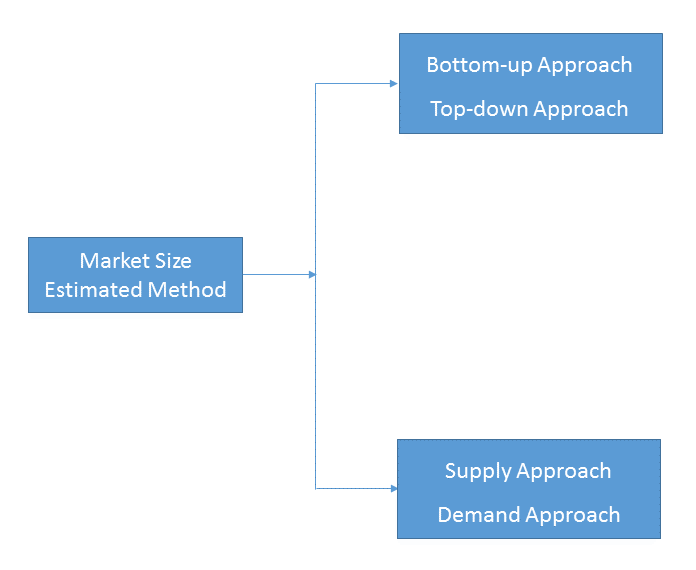
1)Top-down & Bottom-up Approach
Top-down approach uses a general market size figure and determines the percentage that the objective market represents.
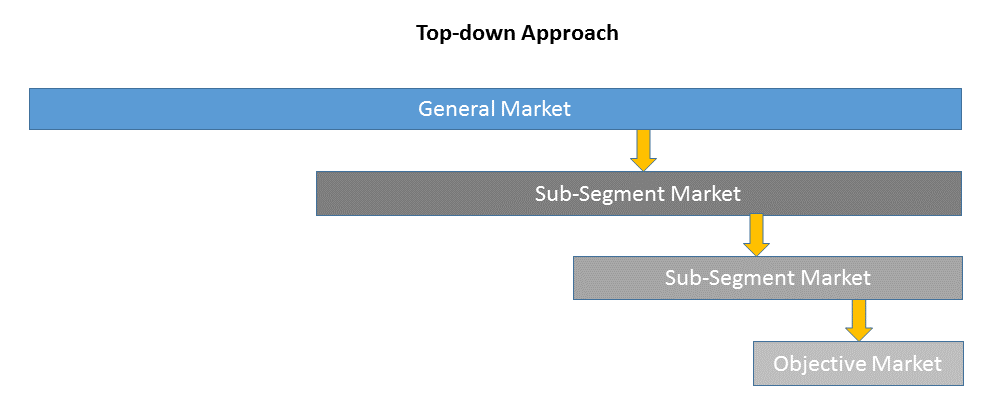
Bottom-up approach size the objective market by collecting the sub-segment information.

2)Supply & Demand Approach
Supply approach is based on assessments of the size of each competitor supplying the objective market.
Demand approach combine end-user data within a market to estimate the objective market size. It is sometimes referred to as bottom-up approach.
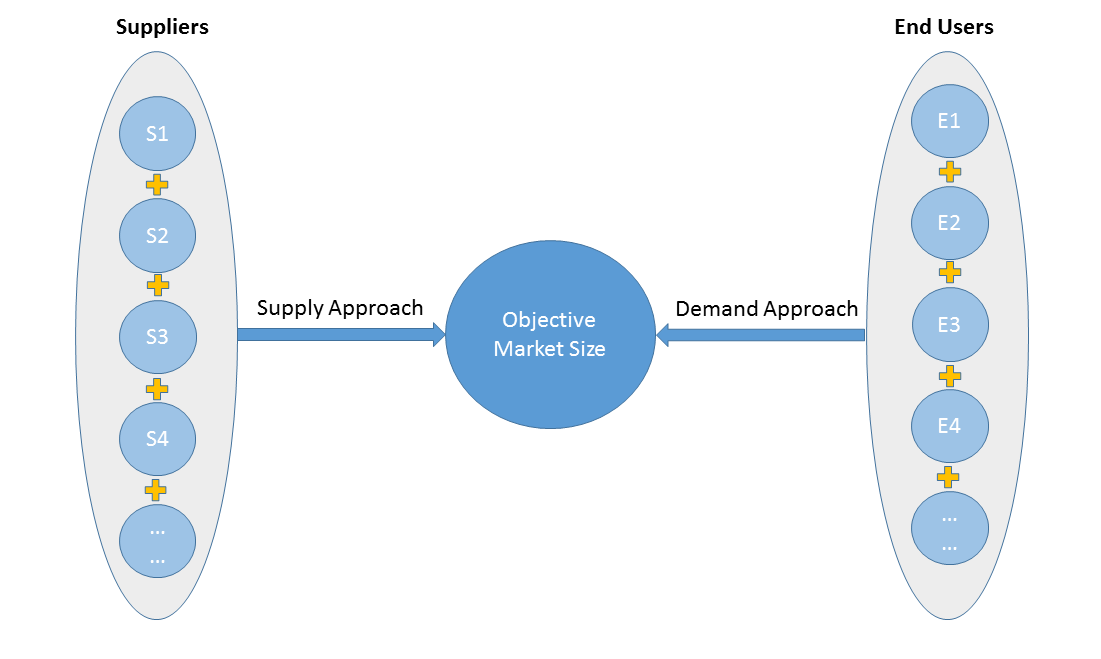
- Forecasting Methodology
- Numerous factors impacting the market trend are considered for forecast model:
- New technology and application in the future;
- New project planned/under contraction;
- Global and regional underlying economic growth;
- Threatens of substitute products;
- Industry expert opinion;
- Policy and Society implication.
- Analysis Tools
1)PEST Analysis
PEST Analysis is a simple and widely used tool that helps our client analyze the Political, Economic, Socio-Cultural, and Technological changes in their business environment.
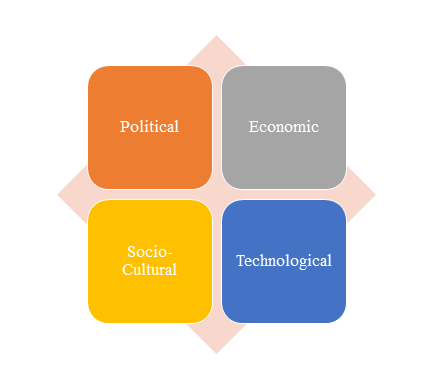
- Benefits of a PEST analysis:
- It helps you to spot business opportunities, and it gives you advanced warning of significant threats.
- It reveals the direction of change within your business environment. This helps you shape what you’re doing, so that you work with change, rather than against it.
- It helps you avoid starting projects that are likely to fail, for reasons beyond your control.
- It can help you break free of unconscious assumptions when you enter a new country, region, or market; because it helps you develop an objective view of this new environment.
2)Porter’s Five Force Model Analysis
The Porter’s Five Force Model is a tool that can be used to analyze the opportunities and overall competitive advantage. The five forces that can assist in determining the competitive intensity and potential attractiveness within a specific area.
- Threat of New Entrants: Profitable industries that yield high returns will attract new firms.
- Threat of Substitutes: A substitute product uses a different technology to try to solve the same economic need.
- Bargaining Power of Customers: the ability of customers to put the firm under pressure, which also affects the customer's sensitivity to price changes.
- Bargaining Power of Suppliers: Suppliers of raw materials, components, labor, and services (such as expertise) to the firm can be a source of power over the firm when there are few substitutes.
- Competitive Rivalry: For most industries the intensity of competitive rivalry is the major determinant of the competitiveness of the industry.
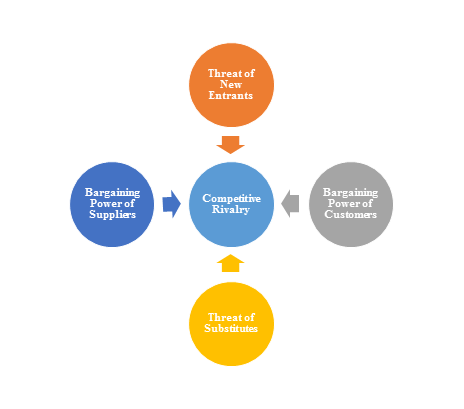
3)Value Chain Analysis
Value chain analysis is a tool to identify activities, within and around the firm and relating these activities to an assessment of competitive strength. Value chain can be analyzed by primary activities and supportive activities. Primary activities include: inbound logistics, operations, outbound logistics, marketing & sales, service. Support activities include: technology development, human resource management, management, finance, legal, planning.
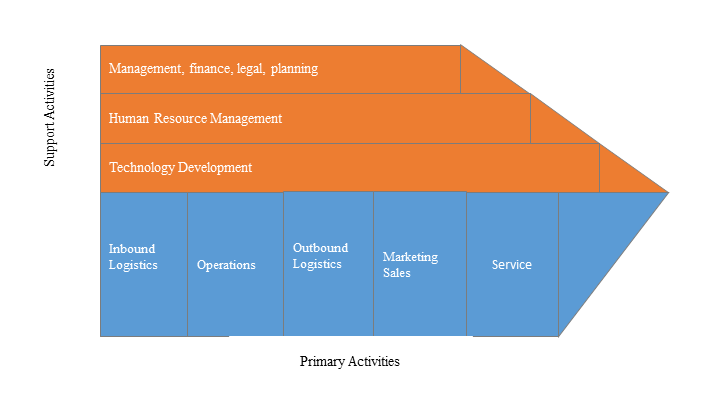
4)SWOT Analysis
SWOT analysis is a tool used to evaluate a company's competitive position by identifying its strengths, weaknesses, opportunities and threats. The strengths and weakness is the inner factor; the opportunities and threats are the external factor. By analyzing the inner and external factors, the analysis can provide the detail information of the position of a player and the characteristics of the industry.
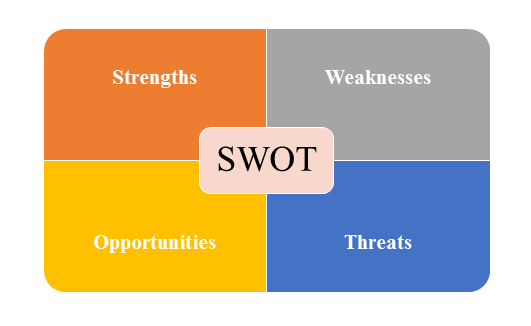
- Strengths describe what the player excels at and separates it from the competition
- Weaknesses stop the player from performing at its optimum level.
- Opportunities refer to favorable external factors that the player can use to give it a competitive advantage.
- Threats refer to factors that have the potential to harm the player.
- Data Sources
| Primary Sources | Secondary Sources |
|---|---|
| Face to face/Phone Interviews with market participants, such as: Manufactures; Distributors; End-users; Experts. Online Survey |
Government/International Organization Data: Annual Report/Presentation/Fact Book Internet Source Information Industry Association Data Free/Purchased Database Market Research Report Book/Journal/News |